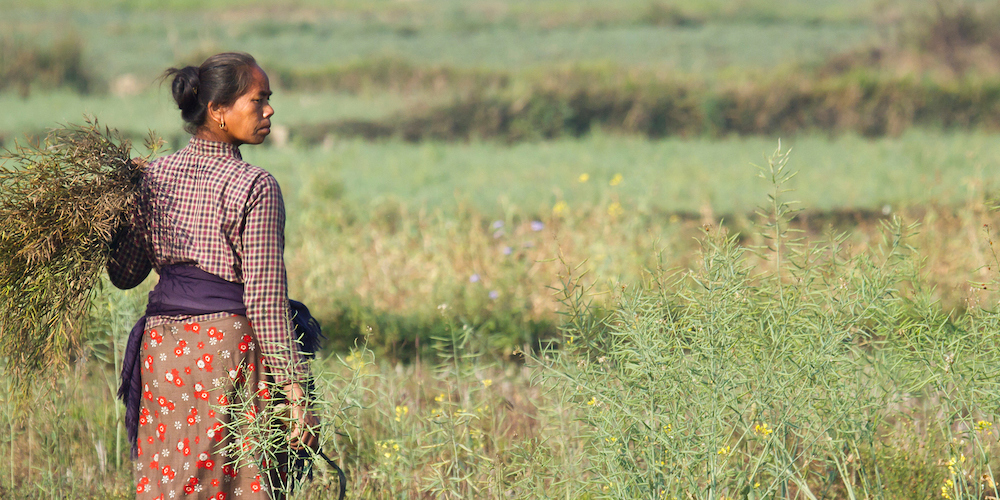Role of Women in Farming

The Modi government says it has succeeded in addressing the gender gap in agricultural extension services
The Government of India is promoting natural farming from 2019-20 under Bharatiya Prakritik Krishi Paddhati (BPKP), a sub scheme of Paramparagat Krishi Vikas Yojana (PKVY). Keeping in view of the strength of Natural Farming and the success achieved in some states, BPKP is being up-scaled in Mission Mode as separate scheme as “National Mission on Natural Farming” (NMNF), says Union Minister of Agriculture and Farmers’ Welfare Shri Narendra Singh Tomar.
The implementation of NMNF including pre-production, production and post production activities are being planned through Community Based Organizations i.e. through women Self Help Group(SHGs), and their federations – Krishi Sakhis, Pashu Sakhis etc. These agencies may also be the ideal choices for setting up and/or operation of Bio-input Resource centers and also act as extended branches of various central institutions for mission implementation.
To address the gender gap in agricultural extension services, under “Support to State Extension Programmes for Extension Reforms” popularly known as Agriculture Technology Management Agency (ATMA), a centrally sponsored scheme has made adequate provisions for women in farming. As per ATMA guidelines, women’s food security groups are promoted. To ensure household food and nutritional security, Farm Women’s Food Security Groups (FSGs) @ at least 2 per block are to be formed each year. These FSGs are supported for training, publication and access to inputs @ Rs.10000 per group.
These FSGs also serve as “Model Food Security Hubs” through establishing kitchen garden, backyard poultry, goatery, animal husbandry & dairying, mushroom cultivation, etc. Further, as per ATMA guidelines, 30% of the beneficiaries should be women farmers/farm women. Also the guideline under 4.1.4 (i) Minimum 30% of resources meant for programmes and activities are required to be allocated to women farmers and women extension functionaries.

As per guidelines, in the ATMA Governing body, out of the non-official members so nominated, one-third would be women farmers. Further, the Block Farmer Advisory Committee (BFAC) and State Farmers Advisory Committee (SFAC) will have at least one third members as women among the progressive farmers. The District Farmers Advisory Committee (DFAC) should also give adequate representation to women. The Gender Coordinator under ATMA will perform the following functions to safeguard the interest of women famers:
– Ensure flow of benefits under all schemes to women farmers.
– Collection of gender dis-aggregated data, and conducting studies and action research in critical thrust areas.
– Promote Farm women’s Food Security Groups and prepare training modules so as to ensure household food security.
– Document the best practices/ Success Stories/ Participatory Material Production related to women in Agriculture.
– Block-wise documentation, prioritization and addressal of farm women’s needs and requirements in agriculture and all allied sectors.
– Will report to State Coordinator in r/o gender related information.
Women are also considered to serve as farmer friends in the villages to support innovative activities under ATMA. Under the Central Sector Scheme of Agri. Clinics and Agri. Business Centres (AC&ABC) of the Ministry of Agriculture and Farmers’ Welfare, women beneficiaries are receiving 44% as subsidy while others will get 36%.
National Institute of Agricultural Extension Management (MANAGE), the Nodal organization and knowledge repository for Bhartiya Prakritik Krishi Padhati (BPKP) has conducted 997 One Day Awareness Programs for Gram Pradhans on Natural Farming covering 56,952 Gram Pradhans across the country. Out of which, 17626 are women participants. A web page on Natural Farming and Knowledge Repository has been created and information related to natural farming collected from various Research and Academic organizations have been uploaded on the website for the benefit of various stakeholders including women farmers. Study material on Natural Farming prepared in 22 regional languages for Gram Pradhans has been shared during the Gram Pradhans awareness program for the benefit of farmers including women farmers.


